Understanding Fat Loss Basics for a Healthier You
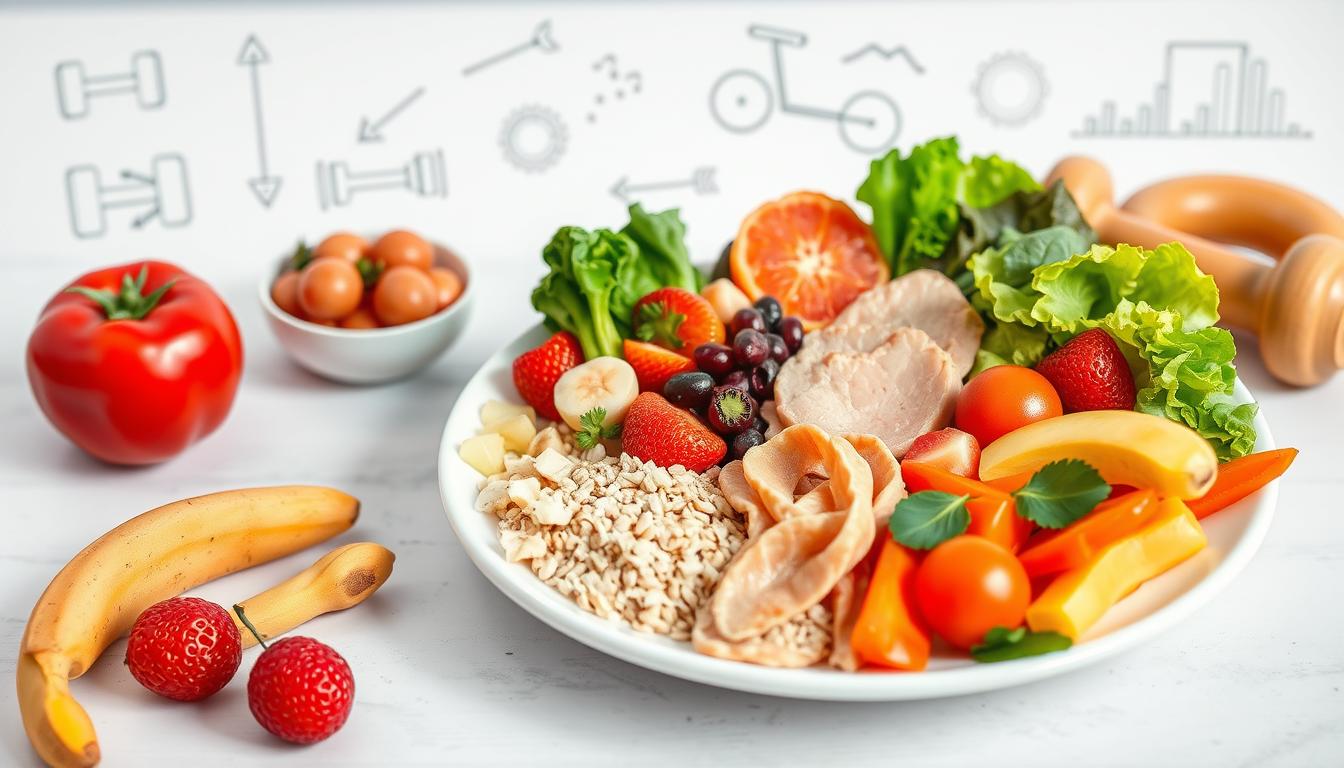
Ever noticed how some friends lose weight easily while you don’t? Well, losing fat isn’t just counting calories. It’s also about knowing your body’s unique needs. This article is your go-to guide for understanding fat loss basics. It will show you how weight loss strategies fit into your daily life.
Remember, fat loss isn’t only about looking good. It’s also about feeling good and being healthy. By learning the right things, you can start eating better. This won’t just help you lose weight but will also boost your life quality. Are you ready to learn how to lose fat the right way? Keep reading for tips that will help you on your health journey!
What Are the Fundamentals of Fat Loss?
Learning about fat loss is similar to discovering a favorite recipe. It’s not just about avoiding carbs or living in the gym. It’s also about mixing several key parts together. First off, having a *calorie deficit* is crucial. When you eat fewer calories than what you burn, your body uses stored fat for energy. That’s the core of losing weight.
Eating right is key on this path. Choose *whole foods* over processed ones, which often have hidden sugars and fats. Go for foods rich in fiber like fruits, veggies, and whole grains. They help you stay full longer, making it easier to say no to junk food. Planning your meals helps you stick to healthy eating and avoid bad food choices when you’re hungry.
Look at your daily routines. Eating three meals a day can help keep away unhealthy snack cravings. Exercise is equally important. It helps burn extra calories and boosts your mood and health. Mixing weights and cardio, about three to four times a week, is great for keeping muscle while shedding fat.
Don’t forget about drinking water. It helps you tell if you’re really hungry or just thirsty, preventing mindless snacking. Be careful with alcohol because it’s full of calories that don’t help your diet. Also, good sleep matters a lot. Bad sleep can mess with your hunger hormones and make you crave calorie-dense foods.
Keeping a food diary can really open your eyes to your eating habits. It helps you understand and improve your food choices. By putting these fat loss basics into practice, you’re on your way to lasting weight loss success.
Calories Matter More Than You Think
Many people don’t realize how important calories are in losing fat. You need a calorie deficit to lose weight. That means burning more calories than you eat. About 10% of your calories go towards digesting food. This shows why it’s crucial to watch your calorie intake carefully.
Non-exercise activities can burn 100 to 800 calories a day. Activities like walking, fidgeting, or standing up count. To lose weight, cutting 500 to 750 calories daily can help you lose 1 to 1.5 pounds each week. Achieving this deficit is easier with smart changes, not just counting every calorie.
Eating whole foods instead of processed ones helps a lot in managing calories and is a big part in fat loss basics. Without added sugars, alcohol, and junk food for four weeks, some have lost about 2.5 pounds. This means they had a 300-calorie deficit daily without strict calorie counting. Quality of food matters more than the amount.
Knowing your basal metabolic rate (BMR) is important. It’s the calories your body needs at rest. BMR depends on things like muscle mass and size, as well as your sex and age. Mostly, men burn calories faster than women because of less body fat and more muscle.
For effective weight loss, aim to cut 200-400 calories daily. Add strength training twice a week to keep your muscles strong. Try to do 30 minutes of moderate exercise every day. Adjust more for bigger weight loss or fitness goals.
In conclusion, be clear with your weight loss plans. To find your daily calorie target, multiply your goal weight by 10. Accurate tracking of what you eat is key. It stops you from underestimating calories. This way, you achieve your goals without expensive and risky cleanses.
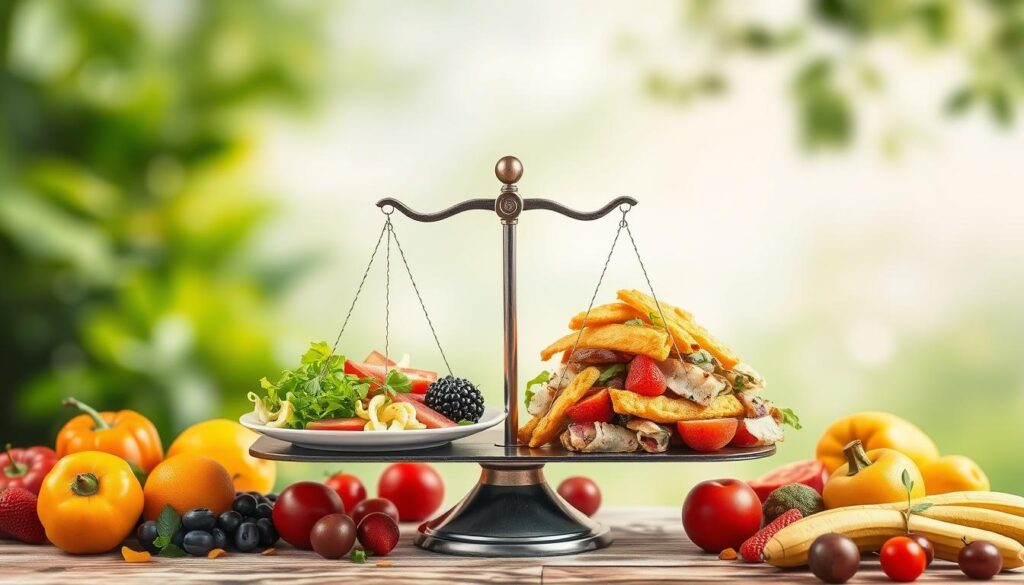
Fat Loss Basics: Building Your Nutrition Plan
To lose fat effectively, you need a good nutrition plan. Choose whole foods instead of processed ones to improve your health. Whole foods, like fruits, vegetables, whole grains, and lean proteins, give you important vitamins and minerals. They also help you feel full, so you’re less likely to snack without thinking.
Understanding Whole Foods vs. Processed Foods
Whole foods keep their nutrients because they’re minimally processed. Processed foods, however, can lead to weight gain since they lack good nutrients. Some examples of whole foods include:
- Fruits like apples and bananas
- Vegetables such as brussels sprouts and beets
- Whole grains like quinoa and oats
- Lean proteins, including skinless chicken breast and black beans
Adding more whole foods to your diet also ups your fiber, which is key for losing weight.
The Role of Fiber in Weight Loss
Fiber-rich diets can really help with fat loss. Fiber keeps your digestion smooth and makes you feel full longer, which can prevent overeating. Some foods high in fiber are:
- Oats (10.4g of fiber per 100g)
- Chickpeas (5.9g)
- Cooked quinoa (2.8g)
- Fruits like bananas (2.2g) and apples (2g)
Aim for 25 to 30 grams of fiber daily for the best weight loss results. So, load up your plate with fiber-packed fruits and veggies!
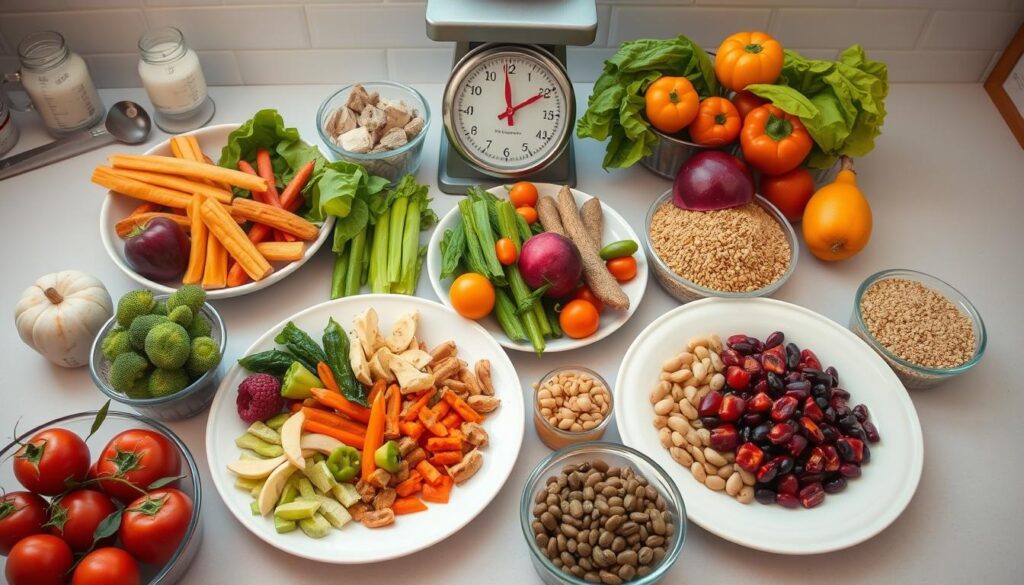
Healthy Eating Habits That Promote Fat Loss
Changing what you eat can really help you lose fat. It’s important to watch how much you eat and to have meals at the same time every day. Doing this helps you stick to a good diet and stay healthy.
Portion Control Techniques
Portion control is about eating the right amount, not eating too little. Here are ways to keep your portions in check:
- Use smaller plates and bowls. This makes you feel full even when you eat less.
- Measure your food instead of eating straight from the box or bag.
- Start with less food on your plate. If you’re still hungry, then have a little more.
- Don’t watch TV or look at your phone while you eat. It’s easy to eat too much when you’re not paying attention.
These tips can help you eat less without feeling like you’re missing out. They’re simple but effective for eating better every day.
The Importance of Regular Meals
Eating regularly is key for keeping your energy steady and avoiding too much snacking. Here’s why it matters:
- Eating at the same times every day helps control your hunger. It also stops you from snacking too much.
- Having a mix of foods at meals, like whole grains, fruits, and veggies, gives you the nutrients you need. This helps with losing and keeping off weight.
- Studies show that eating dinner early can help you lose weight better than eating late.
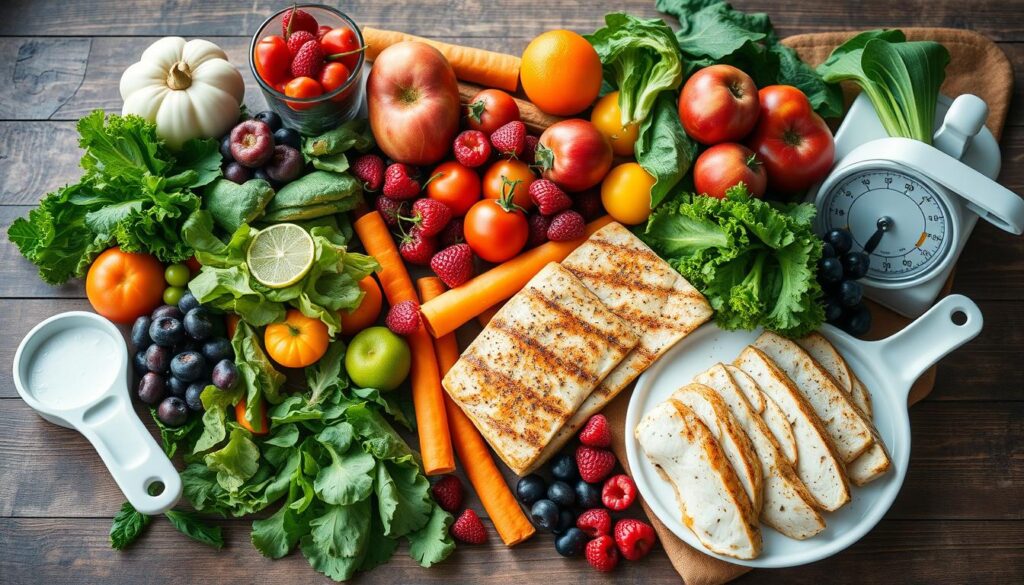
Eating regularly and managing how much you eat can lead to a better relationship with food. It sets the stage for lasting weight loss success.
Exercise Routines for Weight Loss
To lose weight effectively, creating good exercise routines is key. It helps to do fun activities to keep up with it. Mixing cardio and strength training makes your fitness journey both enjoyable and efficient.
Finding Activities You Enjoy
It’s important to find exercises you love. This makes your weight loss journey fun. You stay eager and active. You might like:
- Hiking in nature with friends
- Swimming laps at your local pool
- Cycling around the neighborhood
- Participating in group classes like yoga or Pilates
- Jumping rope or dancing to your favorite music
Fun activities keep you excited and help with fat loss. Making exercise enjoyable leads to consistent workouts and better results.
Incorporating Cardio and Strength Training
Good weight loss routines need both cardio and strength training. Cardio burns calories, and strength training builds muscle and boosts metabolism. A balanced plan could be:
- Week 1: Work on lower and upper body strength, do light cardio, and interval workouts.
- Week 2: Add more weight and intensity but do the same workouts.
- Week 3: Do fewer reps per set but with more weight.
- Week 4: Keep adding weight and do more aerobic workouts.
A mix of these workouts can speed up weight loss if you do them for 20 to 22 minutes. Adding High-Intensity Interval Training helps keep your metabolism up. Try to get at least 300 minutes of moderate activity every week. Every little bit helps, like walking fast or using the stairs.

The Psychological Aspect of Weight Loss
Weight loss isn’t just about your body. It also depends on your mind. The way we think about weight loss is very important. Feeling like you’re missing out on things can make you anxious or upset. Dr. Melanie Greenberg found that feeling deprived can cause an obsession with what we think we’re missing.
Our emotions can make it hard to stick to a diet. Spurlock & Lewon’s 2023 study shows how feelings affect our eating. When we’re very upset or stressed, we might go back to eating unhealthy food. This shows it’s important to deal with our feelings when trying to lose fat.
Understanding why we eat certain foods can help us make better choices. Looking at our habits can show why we eat too much sometimes. Keeping a diary of what we eat can really help, making it easier to see what triggers overeating.
To avoid feeling deprived, it’s better to eat in moderation. Not going to extremes helps us keep a healthy attitude towards food. People who see things in black and white often struggle more with weight loss. Being aware of these thoughts can help improve our approach to managing weight.

Hydration and Its Impact on Weight Management
Staying hydrated is often easier said than done. It plays a huge role in managing our weight. Our bodies consist of roughly 60% water, which shows how vital it is. So, drinking plenty of water can really help if you’re looking to lose weight.
Sometimes, when you think you’re hungry, you might just need water. Studies found that drinking two glasses of water before eating leads to eating 22% less food. This shows that water can help control your appetite. Also, choosing water over sugary drinks cuts down on unnecessary calories.
Moreover, drinking water can boost your metabolism by 30%. This was discovered through studies. In another study, people who drank water before meals ate 13% less. So, water not only controls hunger but also helps the body burn fat more effectively. Not drinking enough water can slow down this process.
- Water helps improve nutrient transport and joint lubrication.
- Better hydration equals enhanced brain function and energy levels.
- Replacing beverage calories with water supports healthier dietary choices.
Include high-water content foods in your diet like cucumbers and watermelon. It’s important to drink enough water every day. For women and men, about 2.0 to 2.5 liters is good. But remember, too much water can also be harmful.
Good hydration can make a big difference in your health and how you manage your weight. Next time you feel like snacking, maybe you should drink a glass of water instead!
Effective Fat Loss Tips for Everyday Life
Small, everyday changes can make a big difference in losing fat. Key actions include planning meals and eating less junk food. These steps can help you change your eating habits and reach your fat loss goals.
Planning Your Meals
Meal planning is a top fat loss tip. It makes you choose healthy foods and avoid spur-of-the-moment eating. Here’s how to plan meals effectively:
- Create a weekly menu full of diverse, whole foods.
- Prepare meals over the weekend for stress-free weekdays.
- Eat protein with each meal to stay full longer.
- Save leftovers for an easy snack or meal, cutting down waste.
- Check what you have before shopping to buy only what you need.
Cutting Down on Junk Food
To eat less junk food, be mindful and have a plan. Tips for eating better and limiting junk food include:
- Have healthy snacks like fruit, nuts, or Greek yogurt on hand.
- Keep fewer processed snacks at home to avoid overeating.
- Cook with fresh ingredients to enhance flavor and nutrition.
- Read food labels to make smarter shopping choices.
- Prep meals in advance to resist cravings.
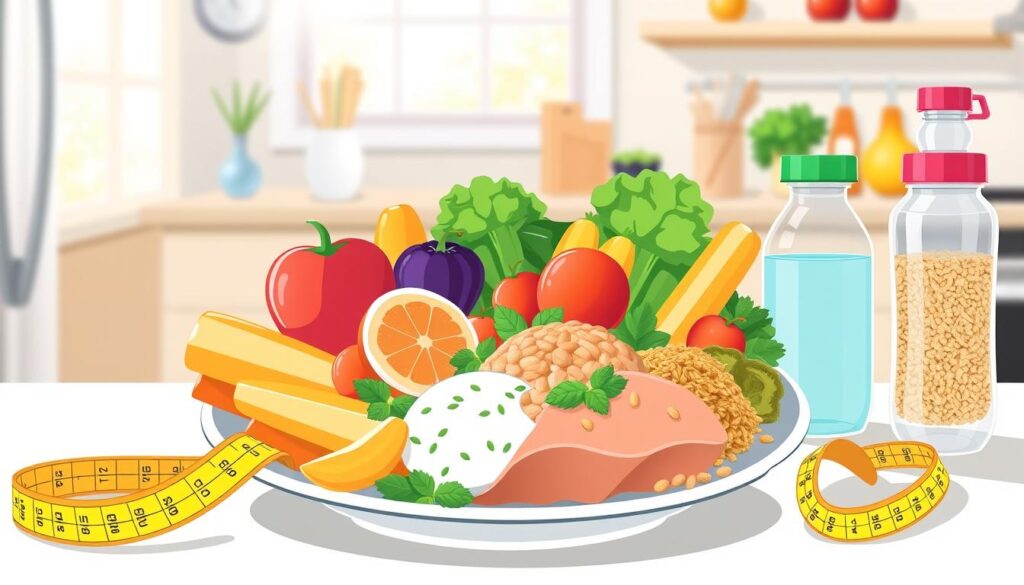
Understanding the Role of Sleep in Fat Loss
In the journey of achieving weight loss, sleep is often an overlooked hero. Over one-third of Americans struggle with sleep deprivation. This negatively impacts their health and fitness goals. Research underscores the importance of sleep in fat loss. With not enough rest, people face late-night cravings more often. They tend to choose snacks that are high in carbs and fat.
A review of studies found that not sleeping enough leads to strong cravings for foods that are rich in energy. For those trying to lose weight, skimping on sleep means they might burn 55% less fat over two weeks, even if they eat the same amount of calories. Also, lacking enough sleep for just four days can make your body 30% less good at managing insulin. This impacts how well your body can process and use fats.
Not getting enough sleep doesn’t just make you feel tired. It can increase your blood sugar levels and make your body less responsive to insulin. This makes losing weight harder. Lack of enough sleep can mess up how your body handles blood sugar. It also ups your chance of becoming obese if you don’t get enough restful sleep.
Also, when you don’t sleep enough, your body makes more of a hormone called acylated ghrelin. This hormone makes you feel hungrier and holds onto fat more. It can cause you to lose more muscle than fat when you’re dieting. The Mayo Clinic found that sleeping only four hours a night for two weeks led to an 11% increase in dangerous visceral fat compared to sleeping nine hours.

Getting good sleep isn’t just good for your energy. It’s crucial for losing fat effectively. Creating a peaceful bedtime routine and cutting down on screen time before bed can improve your sleep quality. This, in turn, helps your weight loss efforts. Knowing how sleep and weight loss are connected can help you on your way to a healthier life.
Common Myths About Fat Loss
Fat loss can be confusing, with so much wrong information out there. Many fat loss myths are spread, confusing people who want real results. With many unproven diet claims, it’s critical to find out what truly works for weight loss.
Debunking Diet Trends
Not all popular diets are helpful for losing fat. Let’s talk about some common wrong beliefs:
- “Carbs are evil”: This is not true. Our bodies need carbs for energy, especially when we are active. Finding the right balance is crucial.
- “All calories are the same”: This isn’t accurate. Where calories come from is very important. Eating foods full of nutrients helps with health and feeling full.
- “supplements can do everything”: Many are tricked by the diet supplement market, which usually doesn’t help much. Real success in weight control comes from steady diet and lifestyle changes.
- “Avoiding fats makes you lose fat”: Eating healthy fats is important for a balanced diet. Just cutting fats, without looking at overall nutrition, can make you crave more and lack nutrients.
The Dietary Guidelines for Americans suggest eating mostly whole grains. They also recommend limiting saturated fat to less than 10% of daily calories. Surprisingly, only about 15% of people keep the weight off long-term. This shows the importance of long-lasting habits over quick solutions.
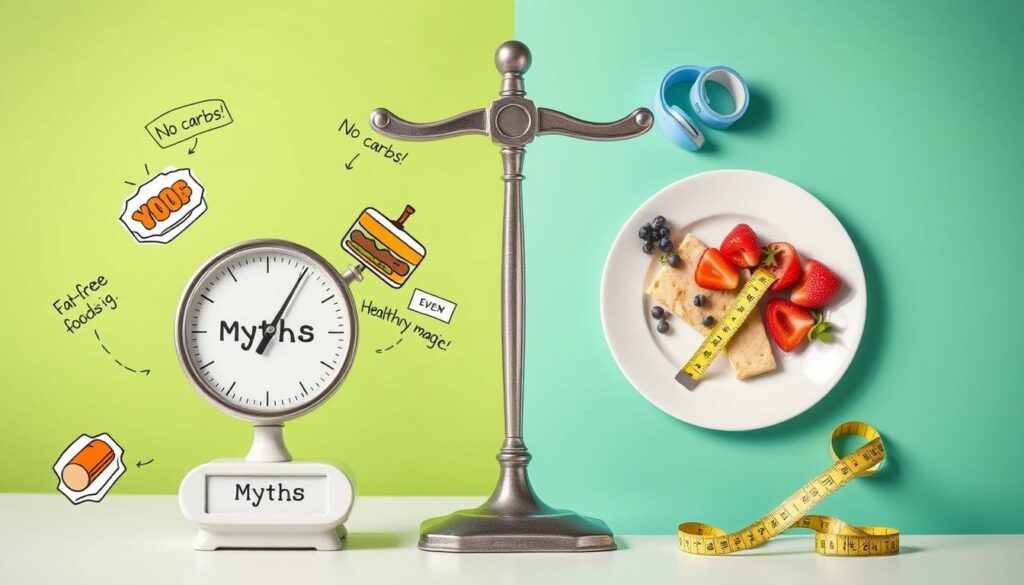
Knowing the truth behind fat loss myths helps people make smarter choices. A good fat loss plan needs a deep understanding of nutrition and lifestyle. It also needs a long-term commitment to staying healthy.
Making Sustainable Changes for Long-Term Success
Getting to sustainable fat loss is not quick. It’s like a relaxed walk in a park. Health experts say aiming to lose 1 to 2 pounds every week is good. They believe setting small, doable goals helps keep you motivated. Instead of going for fast diets with big promises, choose lasting changes to your lifestyle. This makes healthy habits stick with you daily, crucial for keeping success in the long run.
It’s normal to hit plateaus on your weight loss path, so don’t expect constant progress. It’s key to accept both good and bad times while sticking to your plan. Mixing diet changes with more exercise works best. For instance, the Mediterranean diet, rich in fruits, veggies, grains, and healthy fats, is great. It doesn’t just aid in losing weight but also boosts heart health, making life better.
Don’t forget the strength found in community! Joining groups or having a supportive friend can really boost your drive. Studies show people with support achieve greater success. Going for lasting fat loss means being steady and committed; small steps lead to big wins. So, enjoy every part of the journey, cheer for your wins, and keep your health first!
Source Links
- Counting calories: Get back to weight-loss basics
- 12 Sustainable Ways to Burn Body Fat
- Can you boost your metabolism?
- The ABCs of Weight Loss
- 6 proven strategies for weight-loss success
- The Psychology Behind Weight Loss and Emotions
- How to Overcome 4 Psychological Blocks to Weight Loss
- Macronutrients and Fat Loss: Optimizing Your Diet - January 19, 2025
- Top Fat Loss Tools for Effective Weight Management - January 19, 2025
- Setting Achievable Realistic Fat Loss Goals - January 18, 2025